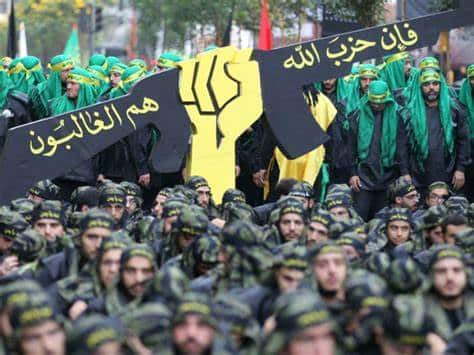A few days ago, an officer working in one of the major UK military headquarters, when asked how concerned UK senior commanders were about escalation of the Gaza situation to a regional war. His response was unequivocal: “they were never seen so worried about anything, even Ukraine.”
To try to deter escalation, the US has deployed two aircraft carrier groups (three if we include an ‘Amphibious Ready Group’ complete with 2,000 Marines) with more combat power than the entire Royal Air Force. The announcement this week that, among other weapons, THAAD ballistic missile defence interceptors are being sent demonstrates the degree of concern US commanders feel. Since Iran is the only system in the region possessing effective ballistic missile force, we can see the direction that the US is looking.
The Iranian-funded and backed Lebanese Hezbollah claims, with good cause, to be the only Arab army to have defeated Israel – in 2006, when it forced the Israelis to withdraw from southern Lebanon after a brief war. Today it is many times more formidable. After a decade and a half of rebuilding after 2006, Hezbollah presents two main immediate threats to Israel.
IKEA – Cover For Corner Sofa, 5-Seat
First, it is estimated to have acquired and produced at least 15,0000 missiles, many of which have been supplied by Iran. Most of these are much more advanced than those being fired by Hamas, with many of them having precision-guidance systems allowing them to strike specific Israeli targets. If they were to come into action, it would be impossible for the Israeli air force to hit all Hezbollah launching sites, even if they were joined by US aircraft, which is highly likely.
Hamas, with a far smaller arsenal, has at times managed to overwhelm the Israeli Iron Dome system. With Hezbollah possessing ten times Hamas’ force, there is a serious risk that its missile onslaught could defeat Iron Dome (despite US reinforcement) and inflict huge damage on Israeli civilian and military targets.
Israel, assisted by US air power, would strike back with overwhelming force on Hezbollah and Lebanese infrastructure, devastating a country already on its knees after a series of crises. The Israelis would also launch a formidable ground assault – the troops are already deployed to act if necessary.
IDF troops would then be faced with Hezbollah’s second major military asset: up to 100,000 well-trained fighters, many with combat experience from their successful expeditions supporting Bashar al-Assad’s army in the Syrian Civil War. The great fear of Western commanders is that all of this would ignite a major regional war, because Iran would almost certainly become directly involved in armed confrontation with Israel and its allies, including the US.
Nasrullah, with considerable Iranian help, he built Hezbollah from a fairly traditional group in the early-mid 1980s into the most formidable Arab force facing Israel. The fact that he has managed to survive at all, certainly at the very top of Israel’s target list, is testament to his and his organisation’s competence and resilience. He sees himself now, and has done for some time, as part of an anti-Israeli ‘resistance axis’ composed of Iran and Sunni Islamist groups such as Hamas.
Neverthless, Nasrullah – along with his Iranian managers – is weighing the costs and consequences of striking Israel at a time when, while it may be demoralised, seems in no mood for military restraint. The immediate strategic result would be the effective destruction of Lebanon as a modern state.
Were Iran to follow, it would cause great damage the regional and global economy. Oil prices would soar for a start. However, Iran would also face the might of US and Israeli and allied air forces, with deeply unpredictable international political consequences.
As matters stand, the military assessment seems to be that detonating such a series of events is probably not in Iranian interests. Hezbollah and Israel are limiting their strikes to the Lebanese border regions.
However, if the Israeli ground offensive takes place, and the level of devastation becomes politically intolerable, the pressure on Hezbollah to intervene to assist their allies in the ‘resistance axis’ in Gaza could become irresistible.













